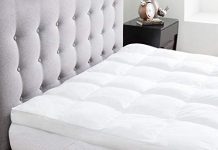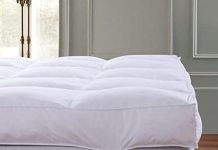Many options exist in the market when choosing a mattress. However, have you ever considered an organic mattress? This article explores whether an organic mattress is worth the investment. From understanding the benefits to exploring potential drawbacks, we delve into the world of organic mattresses and help you decide on a good night’s sleep.
Review contents
Health Benefits
Reduced exposure to chemicals
Choosing an organic mattress can significantly reduce our exposure to harmful chemicals. Conventional mattresses are often treated with chemical flame retardants, such as polybrominated diphenyl ethers (PBDEs), which have been linked to various health issues, including hormonal disruption and even cancer. On the other hand, organic mattresses use natural alternatives for fire resistance, such as wool, eliminating the need for these harmful chemicals. By sleeping on an organic mattress, we can rest easy knowing that we are not inhaling or absorbing potentially harmful substances while we sleep.
Prevention of allergies and respiratory problems
An organic mattress can be a game-changer for individuals who suffer from allergies or respiratory problems. Many conventional mattresses contain synthetic materials, such as synthetic latex or foam, which can off-gas volatile organic compounds (VOCs) and trigger allergic reactions or worsen respiratory conditions. On the other hand, organic mattresses are made from natural materials that are less likely to cause these issues. Additionally, organic mattresses are often hypoallergenic and resistant to dust mites and mold, reducing the risk of allergies and respiratory problems.
Promotion of better sleep
A good night’s sleep is crucial for our overall health and well-being, and an organic mattress can contribute to a better sleep experience. Natural materials used in organic mattresses, such as organic cotton and wool, are breathable and help regulate body temperature, creating a comfortable sleep environment. The absence of chemical additives and flame retardants also eliminates potential irritants that can disrupt sleep. With an organic mattress, we can enjoy a restful and rejuvenating sleep, waking up feeling refreshed and ready to tackle the day.
Support for eco-friendly practices
By choosing an organic mattress, we support eco-friendly practices and a healthier planet. Conventional mattress production often uses synthetic materials derived from non-renewable resources, such as petroleum-based foams. These materials deplete natural resources and emit greenhouse gases during production. On the other hand, organic mattresses are made from renewable and sustainable materials, such as organic cotton and natural latex derived from rubber trees. Opting for an organic mattress can help reduce our carbon footprint and promote a more sustainable future.
Organic Materials
Natural latex
One of the core materials often found in organic mattresses is natural latex. Natural latex is derived from rubber tree sap and processed using eco-friendly methods. It offers excellent support and pressure relief, making it an ideal material for a comfortable and sustainable mattress. Natural latex is also hypoallergenic and resistant to dust mites and mold, making it an excellent choice for people with allergies or asthma.
Organic cotton
Another common material used in organic mattresses is organic cotton. Unlike conventional cotton, which uses synthetic pesticides and fertilizers, organic cotton is grown without harmful chemicals. This means that the cotton fibers used in organic mattresses are free from pesticide residues, creating a healthier sleep environment. Organic cotton is also known for its breathability and softness, offering a comfortable and cozy sleeping surface.
Organic wool
Organic wool is another natural material commonly used in organic mattresses. Wool is naturally flame-resistant, eliminating the need for chemical flame retardants. It is also breathable and moisture-wicking, helping to regulate body temperature and keep us comfortable throughout the night. Organic wool is sourced from ethically-raised sheep treated humanely, making it a more sustainable and cruelty-free option.
Chemical-free fire retardants
One of the significant advantages of organic mattresses is the absence of chemical flame retardants. Traditional mattresses often contain flame retardants that are linked to various health issues. On the other hand, organic mattresses use natural fire-resistant materials, such as wool or hydrated silica, to meet safety standards without exposing us to harmful chemicals. This ensures that we can sleep comfortably and safely without compromising our health.
Certifications
Global Organic Textile Standard (GOTS)
When shopping for an organic mattress, look out for certifications that guarantee the product’s organic integrity. One such certification is the Global Organic Textile Standard (GOTS). GOTS ensures that the entire textile supply chain meets strict organic and sustainability standards, from harvesting the raw materials to the final product. An organic mattress certified by GOTS assures us that its materials have been organically grown and processed without harmful substances.
Global Organic Latex Standard (GOLS)
For mattresses that contain natural latex, the Global Organic Latex Standard (GOLS) certification is a reliable indicator of their organic quality. GOLS ensures that the latex used in mattresses is sourced from organic rubber plantations that follow strict environmental and social criteria. This certification guarantees that the latex in the mattress is free from synthetic additives and has been produced sustainably.
Soil Association Organic Standard
The Soil Association Organic Standard is another certification that ensures the organic integrity of a mattress. This certification’s rigorous criteria cover the entire organic supply chain, focusing on the sustainable sourcing and processing of organic materials. By choosing a mattress certified by the Soil Association, we can trust that it meets the highest organic standards.
Durability and Longevity
Quality construction
Organic mattresses are known for their quality construction, contributing to their durability and longevity. Unlike conventional mattresses that may use low-quality materials or shortcuts in production, organic mattresses focus on craftsmanship and attention to detail. This results in a mattress built to last, providing us with years of comfortable and restful sleep.
Resistance to wear and tear
The natural materials used in organic mattresses, such as natural latex and organic cotton, are known for their resilience and resistance to wear and tear. Organic latex, for example, is highly durable and maintains its shape and support over time. Organic cotton, on the other hand, is a solid and breathable material that can withstand regular use without losing its comfort or integrity. These qualities ensure that our organic mattress remains in good condition for years.
Long lifespan
Due to their quality construction and resistance to wear and tear, organic mattresses often have a longer lifespan than conventional mattresses. While traditional mattresses may need to be replaced every 7-10 years, an organic mattress can last significantly longer, sometimes up to 20 years or more. Investing in an organic mattress means investing in long-term comfort and savings in the long run.
Potential for higher upfront cost savings
While organic mattresses may have a higher upfront cost than conventional ones, their durability and longevity can lead to cost savings over time. With a longer lifespan, we won’t need to replace our mattress as frequently, saving us money in the long term. Additionally, the potential health benefits and reduced environmental impact of an organic mattress can also contribute to long-term savings by minimizing healthcare costs and reducing our ecological footprint.
Environmental Impact
Reduced use of harmful chemicals
One of the leading environmental benefits of organic mattresses is the reduced use of harmful chemicals. Conventional mattress production often involves synthetic materials and chemical additives, contributing to pollution and environmental degradation. On the other hand, organic mattresses are made from natural and organic materials free from harsh chemicals, reducing our exposure to toxins and minimizing the environmental impact.
Preservation of natural resources
Choosing an organic mattress supports the preservation of natural resources. Conventional mattress production relies heavily on non-renewable resources, such as petroleum-based foams and synthetic fibers. These materials require significant energy consumption and contribute to greenhouse gas emissions. On the other hand, organic mattresses utilize renewable and sustainable resources, such as organic cotton and natural latex, reducing our reliance on fossil fuels and minimizing our carbon footprint.
Support for sustainable farming practices
Organic mattresses are made from materials produced using sustainable farming practices. Organic cotton, for example, is grown without synthetic pesticides and genetically modified organisms (GMOs), promoting healthier ecosystems and protecting our planet’s biodiversity. Natural latex, derived from rubber trees, is sourced using sustainable tapping methods that do not harm the trees or surrounding ecosystems. By choosing an organic mattress, we support farmers prioritizing sustainable and eco-friendly agricultural practices.
Reduced landfill waste
Conventional mattresses contribute to landfill waste when discarded, as they often contain non-biodegradable materials that take a long time to decompose. On the other hand, organic mattresses are made from natural and biodegradable materials that can break down without leaving a lasting impact on the environment. When it’s time to replace an organic mattress, it can be recycled, repurposed, or composted, minimizing waste sent to landfills and reducing our ecological footprint.
Considerations for Allergy Sufferers
Hypoallergenic properties
An organic mattress can relieve individuals with allergies or sensitivities due to its hypoallergenic properties. Organic mattresses are made from natural materials and are less likely to trigger allergic reactions. Natural latex, for example, is resistant to dust mites and mold, common allergens. Organic cotton and wool are also naturally hypoallergenic and less likely to irritate. By choosing an organic mattress, allergy sufferers can create a safer and healthier sleep environment for themselves.
Dust mite resistant
Dust mites are microscopic creatures that thrive in mattresses, feeding on dead skin cells and causing allergic reactions in many individuals. Organic mattresses, particularly those made with natural latex, naturally resist dust mites. The dense structure of natural latex creates an inhospitable environment for dust mites, making an organic mattress an excellent choice for individuals prone to dust mite allergies. By sleeping on an organic mattress, we can minimize the presence of these allergens and enjoy a more comfortable sleep.
Chemical-free
Many conventional mattresses contain synthetic materials and chemical additives that can irritate the respiratory system and trigger allergies. On the other hand, organic mattresses are free from these harmful chemicals, providing a safer and healthier sleeping surface. Individuals with chemical sensitivities can reduce their exposure to potential allergens and sleep more peacefully by opting for an organic mattress.
Potential Disadvantages
Higher upfront cost
One potential drawback of organic mattresses is their higher upfront cost than conventional mattresses. The use of organic and natural materials, certifications, and sustainable production methods contribute to the higher price tag. However, it’s essential to consider the potential long-term cost savings and health benefits associated with an organic mattress. Despite the initial investment, the durability and longevity of organic mattresses can outweigh the higher upfront cost in the long run.
Availability and variety
Organic mattresses may have limited availability and variety, especially compared to conventional mattresses. While there has been an increasing demand for organic products, the market for organic mattresses is still relatively niche. Finding a wide range of options and styles may be more challenging. However, with the growing awareness of the benefits of organic living, more brands are entering the market, offering a greater variety of organic mattress options.
Potential for mislabeling or greenwashing
As the demand for organic products grows, there is a potential for mislabeling or greenwashing in the organic mattress industry. Some companies may claim that their mattresses are organic when they only contain a small percentage of organic materials or misuse organic-sounding brand names. To ensure the authenticity of an organic mattress, it’s crucial to look for reputable certifications such as GOTS or GOLS. These certifications guarantee that the mattress meets stringent organic standards and are a reliable way to avoid falling prey to mislabeling or greenwashing.
Availability and Price Range
Online retailers and specialty stores
Organic mattresses are available through various channels, including online retailers and specialty stores. Online retailers can provide a convenient way to shop for organic mattresses, with the ability to browse different options and read customer reviews from our homes. Specialty stores focusing on organic and natural products may offer a more personalized shopping experience, allowing us to test the mattresses in person and speak with knowledgeable staff. With the rise in popularity of organic living, the availability of organic mattresses has increased, making them more accessible to a broader audience.
Boutique brands vs mainstream brands
When considering organic mattresses, we can choose between boutique and mainstream brands. Boutique brands often specialize in organic and natural products and prioritize sustainability and craftsmanship. They may offer a more curated selection of organic mattresses, focusing on quality and eco-friendly production methods. On the other hand, mainstream brands are more prominent and well-known but may have a limited selection of organic mattresses. While both options have their merits, it’s essential to carefully research and compare brands to find the best organic mattress that suits our needs and preferences.
Price range comparison
The price of organic mattresses can vary depending on factors such as brand, size, materials used, and certifications obtained. Generally, organic mattresses are more expensive than conventional ones due to the higher cost of organic materials and sustainable production practices. However, it’s essential to consider the potential long-term cost savings and health benefits associated with an organic mattress. While the upfront cost may be higher, the durability and longevity of the mattress can offset the initial investment. Additionally, an organic mattress’s environmental and health advantages make it a worthwhile investment for those seeking a sustainable and healthy sleep environment.
Finding the Right Organic Mattress
Research and compare brands
When searching for the right organic mattress, it’s crucial to research and compare different brands. Look for reputable companies that prioritize organic and sustainable production methods. Consider the materials used, certifications obtained, and customer reviews. Reading customer reviews can provide valuable insights into the mattress’s comfort, durability, and overall satisfaction. By doing thorough research and comparing brands, we can make an informed decision and find the best organic mattress that meets our needs and preferences.
Read customer reviews
Customer reviews can be an invaluable resource when choosing an organic mattress. Reading reviews from other customers who have already purchased and slept on the mattress can provide valuable insights into its comfort, durability, and overall satisfaction. Please pay attention to reviews from individuals with similar sleep preferences or concerns, as their experiences may be more relevant to our own. By considering a range of customer feedback, we can gather a well-rounded understanding of the mattress and make a more informed decision.
Test out mattresses in-store or utilize trial periods.
If possible, try to test out different organic mattresses in-store or take advantage of trial periods offered by online retailers. Testing out a mattress in person allows us to experience its comfort, support, and overall feel. Lie on the mattress and spend a few minutes in different sleeping positions to understand its suitability. If purchasing online, take advantage of trial periods that allow you to sleep on the mattress in the comfort of your home. This ensures we can thoroughly evaluate the mattress and determine if it meets our expectations before purchasing.
Conclusion
Considering our health and environmental impact is essential when deciding whether an organic mattress is worth it. The health benefits of reduced exposure to chemicals, prevention of allergies and respiratory problems, and support for eco-friendly practices make organic mattresses attractive. The use of organic materials, such as natural latex, organic cotton, and organic wool, further enhances the comfort and sustainability of these mattresses.
Certifications such as GOTS, GOLS, and the Soil Association Organic Standard assure the mattress’s organic integrity. The durability and longevity of organic mattresses and their potential for higher upfront cost savings make them a wise investment in the long run. With a reduced environmental impact, considerations for allergy sufferers, and the potential for better sleep, organic mattresses offer a holistic approach to healthy and sustainable living.
By weighing the benefits against the upfront cost, researching and comparing brands, and making an informed decision based on our priorities, we can find the right organic mattress that aligns with our values and provides quality sleep for years.
























